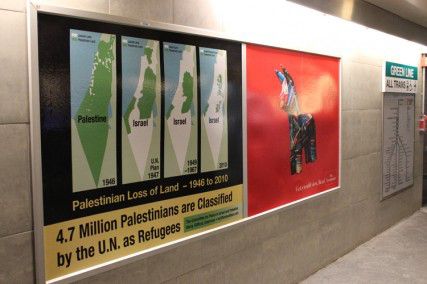
After a controversial advertisement ran in Boston’s T stations regarding the Israeli-Palestine conflict, a non-profit law firm filed an injunction Wednesday against the Massachusetts Bay Transportation Authority over its refusal to run a similar ad created by the American Freedom Defense Initiative that promotes pro-Israel sentiment.
The American Freedom Law Center filed the suit on behalf of the AFDI on the grounds that refusing to run the advertisement violated their client’s First and 14th Amendment rights under the U.S. Constitution.
“The restriction is not only content-based,” said Robert Muise, a lawyer at the AFLC. “It’s viewpoint-based, and viewpoint-based restrictions are the most egregious form of content discrimination under the First Amendment.”
In October, advertisements first appeared that depict the Palestinian loss of land to Israel from 1946 to 2010 and that state the UN classifies 4.7 million Palestinians as refugees.
The declined advertisement stated, “in any war between the civilized man and the savage, support the civilized man” and encourages viewers to support Israel over Palestine and to “defeat Jihad,” according to the suit.
Kelly Smith, spokeswoman for the MBTA, said the rejection of the ad had nothing to do with preference or bias.
“The MBTA is asking that the message be modified to meet the requirements of the MBTA’s advertising standards,” she said. “The MBTA is not opposed to groups expressing their points of view, but it must be done in a respectful manner that recognizes and appreciates the cultural diversity of a public transit environment.”
Muise said it is unfair to allow for one side of an issue to be represented, but not the other.
“When the government opens a forum to allow discussion and debate on a particular issue, but yet they prohibit one side of that debate based on the viewpoint expressed by the message, that is … exceedingly troubling under the First Amendment,” she said.
Michael Melstner, professor of law at Northeastern University, said the AFLC’s case could be valid.
“What you seem to have here is an allegation that they [the MBTA] took one position and not another,” he said. “The First Amendment doesn’t permit government [the court] to decide that something is unpleasant or in bad taste, or wrong … Even assume this is hate speech. That’s not a justification for its censorship unless some other set of factors come into play.”
Several people who said they saw the first ad on the T said regardless of their opinion on the ad, they were against the restriction of the second one.
Lorne Johnson, 29, of Dorchester, said though he did not find either advertisement offensive, he felt it was unfair to restrict the publication of the AFDI’s ad.
“The MBTA passengers or customers have to form their own opinion [on] the matter,” he said. “If the MBTA is going to allow one group to advertise, they should allow the opposition to advertise as well.”
David Noe, 23, of Allston, said where the constitutional rights applied was a gray area in this case.
“It’s not fair to run one [ad] but not the other,” he said “They [the AFDI] should be allowed to express what they want to express, but it’s the MBTA’s actual railroad so they should be able to choose what gets posted and what doesn’t get posted.”
Marcos Gonsalez, 22, of Fenway, said he did not approve of the AFDI’s message, but that they had a right to display it.
“In each of [these ads] they’re defending a case, but … their [AFDI’s] message is a lot stronger than the first one,” he said. “If you’re going to send messages about the war, it’s hard to control until when that message has crossed the line. I believe that once you let people make messages about the war, everything [should be allowed to be advertised].”
Muise said he anticipated a hearing for the suit to occur in the first week of December.


















































































































Arafat • Nov 11, 2013 at 10:07 am
Man alive! It’s a full-time job fighting Palestinian propaganda.